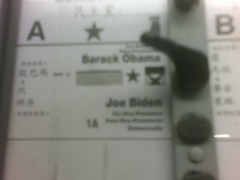Sometimes when I can’t sleep at night I list all the U.S. presidents in order of service.
Last night I was wondering, who is the most obscure U.S. president? The one that nobody remembers?
I have my choice, which might not be shared by everyone, since I know a lot about the presidents.
My first instinct is to say Millard Fillmore. But it can’t be him, because he’s the stereotypical obscure president. If asked to name an obscure president, everyone would name Fillmore. He’s known for being obscure. Therefore, paradoxically, it can’t be him.
It can’t be 20th-century president, because they’re all too familiar to us.
It can’t be any president who was assassinated or died in office, because they’re remembered for that exact reason. So William Henry Harrison, James Garfield, and William McKinley are out. Harrison had the shortest presidency — about a month — but he’s remembered for that very reason.
It can’t be any of the Founding Father presidents — except maybe James Monroe. But the Monroe Doctrine is named after him. So while he’s a good candidate for most obscure, he’s not ideal.
It might be Rutherford B. Hayes, except that eight years ago, everyone was comparing the Bush-Gore deadlock to the Hayes-Tilden deadlock that ended up in the Supreme Court. So he’s out.
James Buchanan is typically ranked as one of the worst presidents, so he has a reason to be remembered. It can’t be Buchanan.
Franklin Pierce came just before Buchanan; while he’s one of the most obscure, he still gets paired with Buchanan a lot. So it’s not Pierce.
For me it comes down to two presidents, but one has a slight edge. The second-most obscure, I think, is Chester A. Arthur, who took over after Garfield was assassinated. Few people seem to remember President Arthur. But the thing that holds him back from being most obscure is that he’s one of the “bearded presidents,” the presidents of the Gilded Age, who all seem to run together. When looking for obscure presidents, people often look to this group. So Arthur has a disadvantage similar to that of Millard Fillmore.
My ultimate choice for most obscure U.S. president?
John Tyler.
Why Tyler, especially since his name is part of a famous political slogan — “Tippecanoe and Tyler Too”?
I don’t know. I just always forget about him.
First, he has such an ordinary name. John Tyler. He could be the guy across the street.
Tyler became president when William Henry Harrison died. It was the first time a vice president had taken over, and people didn’t know what to call him at first. Acting President? Vice President, but with presidential duties? Or just plain President? He became President Tyler, and ever since, all presidents who took office due to the death of another have assumed the full powers of the office.
Harrison had been a Whig, but Tyler was a Whig in name only. He was really a Democrat at heart, and he only became a Whig in order to be named as Harrison’s running mate. (Harrison, who was from Ohio, named Tyler, a Virginian, to help balance the ticket between North and South.) After Tyler became president, he went back on everything the Whigs wanted.
John Tyler: my choice for most obscure U.S. president.


